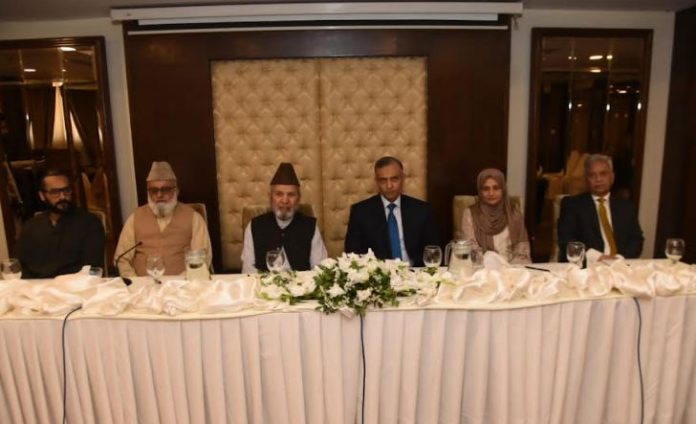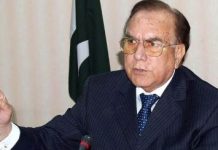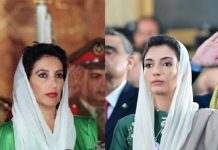ISLAMABAD, MAY 20 /DNA/ – Islamabad Institute of Conflict Resolution – IICR organized a round table conference titled “Unmasking India’s Normalcy Facade: Assessing the G20 Meeting in Occupied Territory” to address the concerning issue of India’s disingenuous democracy and its efforts to justify the occupation by hosting the G20 meeting in the Indian Occupied Jammu and Kashmir (IOJK). The round table conference was organized before the G20 meeting to bring attention to the ongoing human rights violations and advocate for holding the perpetrators of war crimes accountable.
The round table conference was Chaired by Ambassador Maj Gen Dr. Raza Muhammad, President IPRI and former Ambassador. The distinguished panelists included Mr. Ghulam Muhammad Safi, Convener Tehreek e Hurriyat;Advocate Nasir Qadri, Executive Director Legal Forum for Kashmir; Mr.Abdur Rasheed Turabi, Former Ameer, Jamaat e Islami AJK; Dr. Nazir Hussain, Former Dean, Faculty of Social Sciences, QAU Islamabad;Ms. Farzana Yaqoob, Former Minister AJK; Ambassador Fauzia M Sana, Former Ambassador, DG Global, and Research ISSRA NDU; and Ms. Sabah Aslam, Founder, and Executive Director IICR.Ambassador AbdulBasit, Former High commissioner to India, addressed the conference through a pre-recorded video message.
The opening remarks were made by the Chair of the Conference, Ambassador Maj Gen Dr Raza Muhammad. In the opening remarks, he said that the Ministry of foreign affairs and AJK government need to develop a strong strategy to counter India’s nefarious designs in the valley. He demystified India’s normalcy façade post illegal revocation of the special status of Indian Occupied Jammu and Kashmir. He underlined that India’s objective behind organizing the G20 meeting in the occupied territory is to project the façade of normalcy in the region. He also urged Pakistan’s foreign affairs to initiate a strong demarche to the G20 member states participating in the third tourism meeting of the G20 summit in the occupied territory. He formally opened the session for the distinguished panelists and experts.
Mr. Ghulam Muhammad Safi, in his address to the panel, said that India has formed a smokescreen of democracy in the occupied territory of Jammu and Kashmir. He further said that the successive UN resolutions clearly state that the dispossession of the disputed status of the erstwhile state is possible only through a free and impartial plebiscite.
He asserted that Kashmir is an internationally recognized dispute and all the bilateral agreements including the ShimlaAgreement shall be subject to the UN resolutions. India,since the day first of Kashmir’s occupation, has been engaged in the gradual erosion of Kashmir’s status and the unilateral actions of August 5, 2019,have been the masterstrokethat robbed the Kashmiris of their fundamental rights.
Advocate Nasir Qadri, in his intervention,highlighted the lack of proactive lawfare pertaining to the Kashmir issue from the successive governments of Pakistan. He underscored that India has initiated an all-out ‘legal’ action against Kashmiris to alter the status of the Kashmir issue and to implement its settler colonial program. “It is high time that the state of Pakistan comes clear on its policy on Kashmir and launches a sustained and proactive lawfare campaign to bring the perpetrators of atrocity crimes in IIOJK to justice” he added.
Mr. Abdul Rasheed Turabilamented about the inaction of the state of Pakistan, and the lack of an effective and sustained Kashmir policy. He proposed immediate practical counteractions in IIOJK and AJK to highlight and expose the agenda behind conducting the G20 meeting in the region. He assured that the Jamat-e-Islami Pakistan and AJK stood by their brethren in the occupied territory during these testing times. He reiterated the full support to the strike and protest call issued by the All Parties Hurriyat Conference AJK Chapter.
Ambassador AbdulBasit, in his pre-recorded video message, highlighted the need for a well-calibrated multi-pronged strategy to counter India’s unilateral and unlawful actions in the occupied territory. He further proposed the appointment of a special envoy on Kashmir and a plebiscite advisor by the AJK government.
Dr. Nazir Hussain, while addressing the panel elucidated the pressing need to frame a long-term Kashmir policy. He also proposed the appointment of a Permanent Special Rapporteur on Kashmir, along the lines of Palestine and Western Sahara. He further urged that the AJK be declared as the bastion of Kashmir’s resistance movement.
Ms. Farzana Yaqoob, in her interjection, urged the Govt of Pakistan to trust the people of AJK and GB, and to involve them in the policy-making on the Kashmir issue. While commenting on the Kashmiris’ legitimate right to self-defense, she underlined that Pakistan should not disown the Kashmiris fighting against India’s military occupation.
Ambassador Fauzia M Sana, in her brief intervention, discussed the various thought processes on the Kashmir issue. Highlighting the inconsistencies of policies on the Kashmir issue, she said that there is a need for consistent Kashmir policy with no change in the stance. She asserted that Pakistan’s diplomatic fraternity will not shy away from its duties on the Kashmir issue.
In his concluding remarksthe Chair of the Conference, Ambassador Maj Gen Dr Raza Muhammadstated that Pakistan has never compromised on its principle stance on Kashmir and will do whatever it takes to assist Kashmiris in their just struggle for right to self-determination.
Ms. Sabah Aslam, Founder, and Executive Director IICR, thanked all the distinguished panelists and the participants of the conference. She urged the government of Pakistan to provide material support to the resistance movement beyond the rhetoric of political, moral, and diplomatic support.












